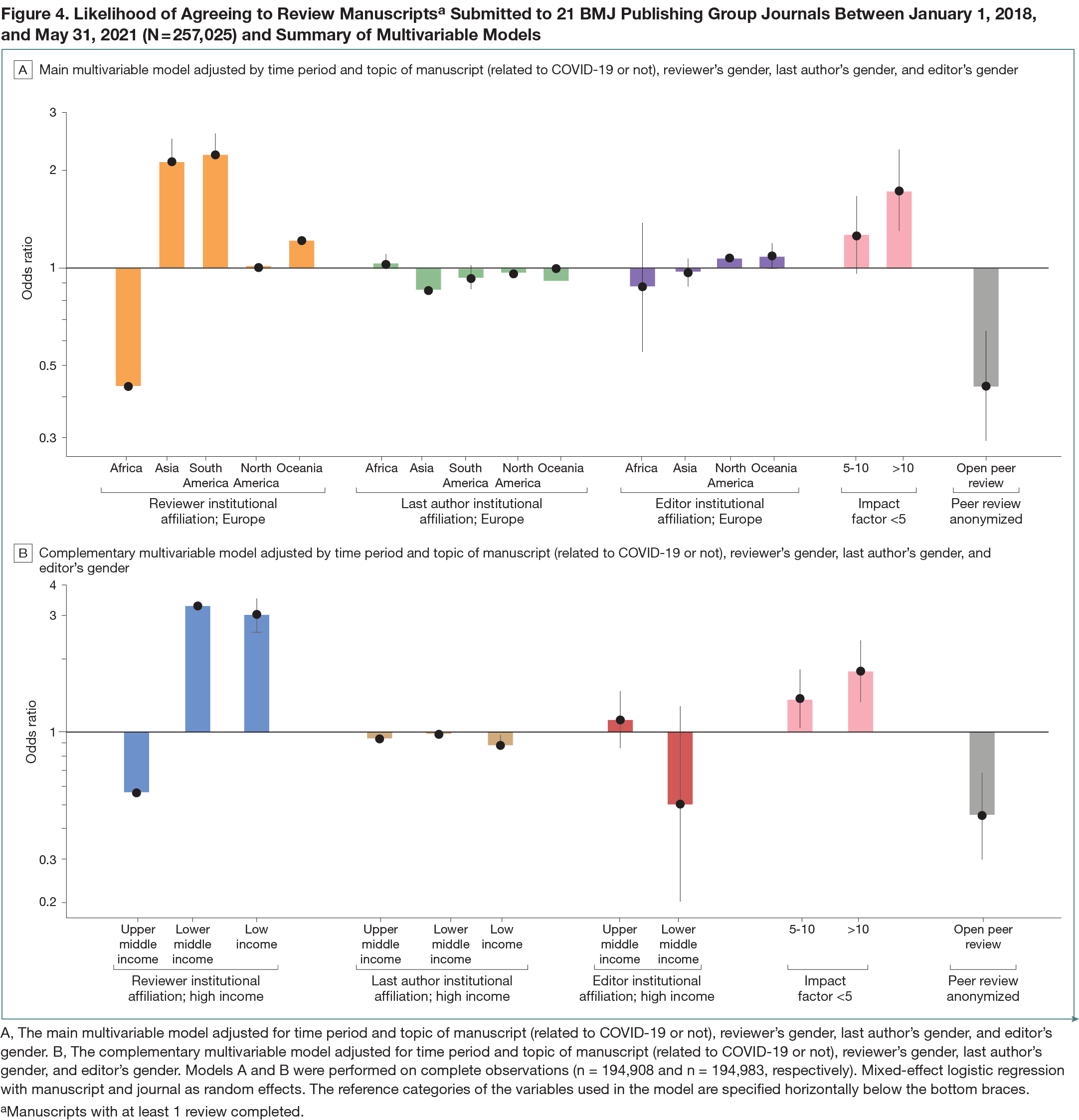Abstract
Factors Associated With Geographical Diversity of Reviewers Invited and Agreeing to Review for 21 Biomedical Journals
Khaoula Ben Messaoud,1,2 Sara Schroter,3 Mark Richards,4 Angèle Gayet-Ageron1,2
Objective
Geographical disparities have been observed in the acquisition of research grants and in the submission and publication of research articles. Peer reviewers are selected primarily based on their expertise through publication records. Response to peer invitation has been shown to be related to relevance of topic to own work, reviewer availability, journal attributes (impact factor and type of reviewer blinding) and compensation.1,2 However, diversity in terms of geographical distribution in response to peer invitations remains almost unexplored.3
Design
Retrospective cohort study of all research manuscripts submitted to 21 BMJ Publishing Group biomedical journals between January 1, 2018, and May 31, 2021, and subsequently sent for review. Data were collected on geographical affiliation, income level of the country of affiliation (according to World Bank Data 2020), journal impact factor, and peer-review process (open vs anonymized). The primary outcome was response (agreed vs not agreed) to review invitation. A multivariable mixed-effects logistic regression model with random factors on the intercept at journal and manuscript levels was performed.
Results
A total of 257,025 reviewers were invited to review and 90,467 (35.2%) agreed. The distribution of geographical affiliations of the invited reviewers were as follows: 10.0% in Africa, 8.8% in Asia, 47.6% in Europe, 26.0% in North America, 6.3% in Oceania, and 1.2% in South America. Among invited reviewers, 217,682 (84.7%) were affiliated with a high-income country. Figure 4 summarizes results from multivariable analysis. Agreement was higher among reviewers from Asia (2.13 [95% CI, 2.05-2.21]), Oceania (1.22 [95% CI, 1.17-1.27]), or South America (2.24 [95% CI, 2.06-2.45]) and lower among reviewers from Africa (0.43 [95% CI, 0.42-0.45] compared with Europe (P < .001). Agreement was significantly lower when the last author was from Asia (0.85 [95% CI, 0.83-0.87]) or Oceania (0.91 [95% CI, 0.87-0.95]) compared with Europe (P < .001). Reviewers agreed significantly more often when the associated editor had a North American institutional affiliation compared with a European affiliation (1.07 [95% CI, 1.02-1.12]). Compared with high-income countries, agreement was higher among reviewers from lower middle–income countries (3.26 [95% CI, 3.06-3.48]) and low-income countries (2.99 [95% CI, 2.57-3.48]) (P < .001). Agreement was also lower when the last author was from an upper middle–income country (0.94 [95% CI, 0.91-0.98]) or low-income country (0.88 [95% CI, 0.81-0.96]) compared with a high-income country (P < .001). Agreement was associated with impact factor (higher for impact factors between 5 and 10, or >10, compared with <5: 1.73 [95% CI, 1.29-2.32] and lower when peer-review process was open compared with anonymized: 0.43 [95% CI, 0.29-0.64]).
Conclusions
The geographical affiliation of reviewers was an independent factor associated with agreement to review. To avoid bias and increase diversity, journal editors need to invite more reviewers from upper middle–income or low-income countries.
References
1. Ellwanger JH, Chies JAB. We need to talk about peer-review: experienced reviewers are not endangered species, but they need motivation. J Clin Epidemiol. 2020;125:201-205. doi:10.1016/j.jclinepi.2020.02.001
2. Tite L, Schroter S. Why do peer reviewers decline to review? a survey. J Epidemiol Community Health. 2007;61(1):9-12. doi:10.1136/jech.2006.049817
3. Masukume G, Grech V. The Lancet peer reviewers: global pattern and distribution. Lancet. 2018;391(10140):2603-2604. doi:10.1016/S0140-6736(18)31136-X
1Department of Health and Community Medicine, University of Geneva, Geneva, Switzerland, Khaoula.BenMessaoud@unige.chkhaoula.benmessaoud@unige.ch; 2Division of Clinical Epidemiology, University Hospitals of Geneva, Geneva, Switzerland; 3The BMJ, London, UK; 4Article Transfer Service, BMJ Publishing Group, London, UK
Conflict of Interest Disclosures
All authors have completed the ICMJE uniform disclosure form at https://www.icmje.org/disclosure-of-interest/ and declare support from the University Hospitals of Geneva, Geneva Medical School, and the Swiss National Science Foundation for the submitted work. Sara Schroter and Mark Richards are full-time employees of BMJ Publishing Group but were not involved in decision making on congress submissions. There were no other relationships or activities that could appear to have influenced the submitted work.
Funding/Support
This study was supported by grant 192374 from the Swiss National Science Foundation.
Role of the Funder/Sponsor
The funder had no role in the design and conduct of the study; collection, management, analysis, and interpretation of the data; or preparation, review, or approval of the abstract.

